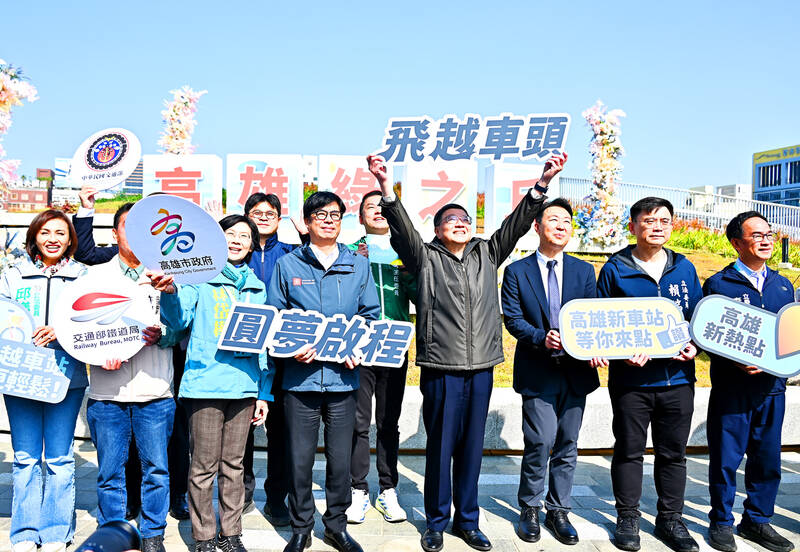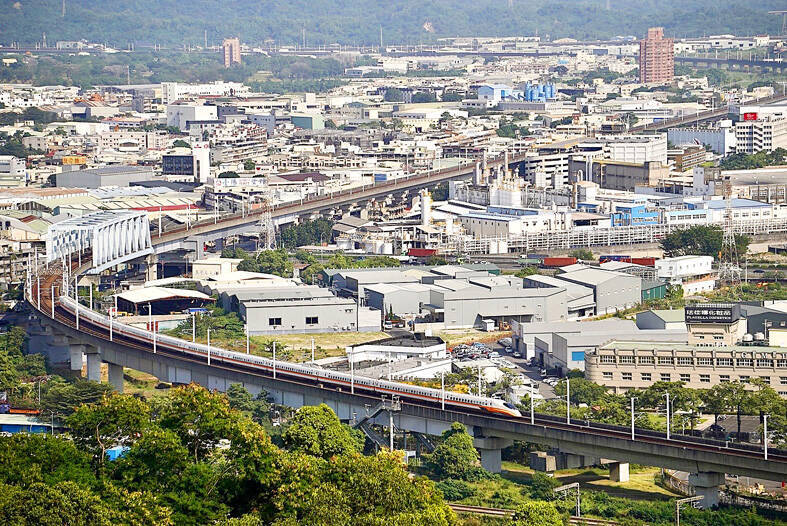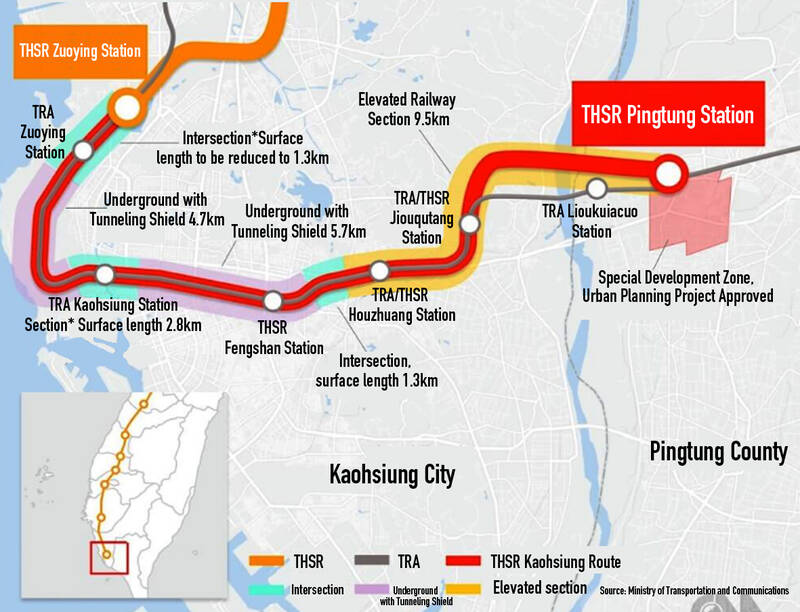Premier Cho Jung-tai (卓榮泰) yesterday confirmed a project to extend the high-speed rail (HSR) to Pingtung County through Kaohsiung.
Cho made the announcement at a ceremony commemorating the completion of a dome at Kaohsiung Main Station.
The Ministry of Transportation and Communications approved the HSR expansion in 2019 using a route that branches off a line from Zuoying Station in Kaohsiung’s Zuoying District (左營). The project was ultimately delayed due to a lack of support for the route.

Photo: Lee Hui-chou, Taipei Times
The Zuoying route would have trains stop at the Zuoying Station and return to a junction before traveling southward to Pingtung County’s Lioukuaicuo Township (六塊厝). On the Kaohsiung route, an HSR train would travel under the city.
The route was controversial as it would pass through areas with petrochemical plants, while a rerouting option was considered risky as it would overlap with rail lines out of Zuoying.
After two forums and five public information sessions, the Railway Bureau concluded that it had safety concerns with the Zuoying route, while the Kaohsiung route would better benefit the region.

Photo: CNA
The project would seek to limit the construction effects on transportation, people and the environment by using cutting-edge technology, Cho said, adding that the bureau would add more greenery along the route.
The project would help Kaohsiung and Pingtung governments plan for local infrastructure around the route and help implement the Executive Yuan’s plans to create a new technology center in Taiwan’s south, he said.
The expansion would also help southern Taiwan become a critical gateway for the government’s New Southbound Policy, he added.

Image: CNA
Kaohsiung Mayor Chen Chi-mai (陳其邁) had repeatedly said that regardless of which route was chosen, it must be feasible, have minimal impact on nearby communities and endeavor to align with the municipal government’s development goals.
Chen said he hoped the project limits how much it inconveniences residents, and property and asset losses in the area.
Cabinet spokeswoman Michelle Lee (李慧芝) said the project would merge Pingtung and Kaohsiung into a large urban sphere, connecting technology centers in the area and fostering greater technological development.
Pingtung County Commissioner Chou Chun-mi (周春米) welcomed the announcement, saying that it would foster coprosperity between Kaohsiung and Pingtung.
Construction has already begun for Pingtung Science Park, and the county government is looking for prospective companies to move in, Chou said, adding that the convenience of an HSR line would help attract companies to the area.
The Railway Bureau said it would need to reassess the project and conduct fresh rounds of environmental assessments, adding that the process could take up to four years.
The Kaohsiung route, the most expensive of the four proposed routes, and estimated to cost NT$120 billion (US$3.67 billion at the current exchange rate) in 2019, would have to be financially reassessed, it said.
Due to rising construction fees, inflation and material costs, the bureau estimated that the project — which includes a new station at Kaohsiung’s Fongshan District (鳳山) — would cost NT$20 billion to NT$25 billion.
The 25.9km extension would include a 16.4km underground section from Zuoying to Fongshan, and a 9.5km elevated section from Fongshan to Pingtung.
Additional reporting by Chung Li-hua

The Ministry of Foreign Affairs (MOFA) yesterday said it is closely monitoring developments in Venezuela, and would continue to cooperate with democratic allies and work together for regional and global security, stability, and prosperity. The remarks came after the US on Saturday launched a series of airstrikes in Venezuela and kidnapped Venezuelan President Nicolas Maduro, who was later flown to New York along with his wife. The pair face US charges related to drug trafficking and alleged cooperation with gangs designated as terrorist organizations. Maduro has denied the allegations. The ministry said that it is closely monitoring the political and economic situation

Conflict with Taiwan could leave China with “massive economic disruption, catastrophic military losses, significant social unrest, and devastating sanctions,” a US think tank said in a report released on Monday. The German Marshall Fund released a report titled If China Attacks Taiwan: The Consequences for China of “Minor Conflict” and “Major War” Scenarios. The report details the “massive” economic, military, social and international costs to China in the event of a minor conflict or major war with Taiwan, estimating that the Chinese People’s Liberation Army (PLA) could sustain losses of more than half of its active-duty ground forces, including 100,000 troops. Understanding Chinese

UNRELENTING: China attempted cyberattacks on Taiwan’s critical infrastructure 2.63 million times per day last year, up from 1.23 million in 2023, the NSB said China’s cyberarmy has long engaged in cyberattacks against Taiwan’s critical infrastructure, employing diverse and evolving tactics, the National Security Bureau (NSB) said yesterday, adding that cyberattacks on critical energy infrastructure last year increased 10-fold compared with the previous year. The NSB yesterday released a report titled Analysis on China’s Cyber Threats to Taiwan’s Critical Infrastructure in 2025, outlining the number of cyberattacks, major tactics and hacker groups. Taiwan’s national intelligence community identified a large number of cybersecurity incidents last year, the bureau said in a statement. China’s cyberarmy last year launched an average of 2.63 million intrusion attempts per day targeting Taiwan’s critical

‘SLICING METHOD’: In the event of a blockade, the China Coast Guard would intercept Taiwanese ships while its navy would seek to deter foreign intervention China’s military drills around Taiwan this week signaled potential strategies to cut the nation off from energy supplies and foreign military assistance, a US think tank report said. The Chinese People’s Liberation Army (PLA) conducted what it called “Justice Mission 2025” exercises from Monday to Tuesday in five maritime zones and airspace around Taiwan, calling them a warning to “Taiwanese independence” forces. In a report released on Wednesday, the Institute for the Study of War said the exercises effectively simulated blocking shipping routes to major port cities, including Kaohsiung, Keelung and Hualien. Taiwan would be highly vulnerable under such a blockade, because it